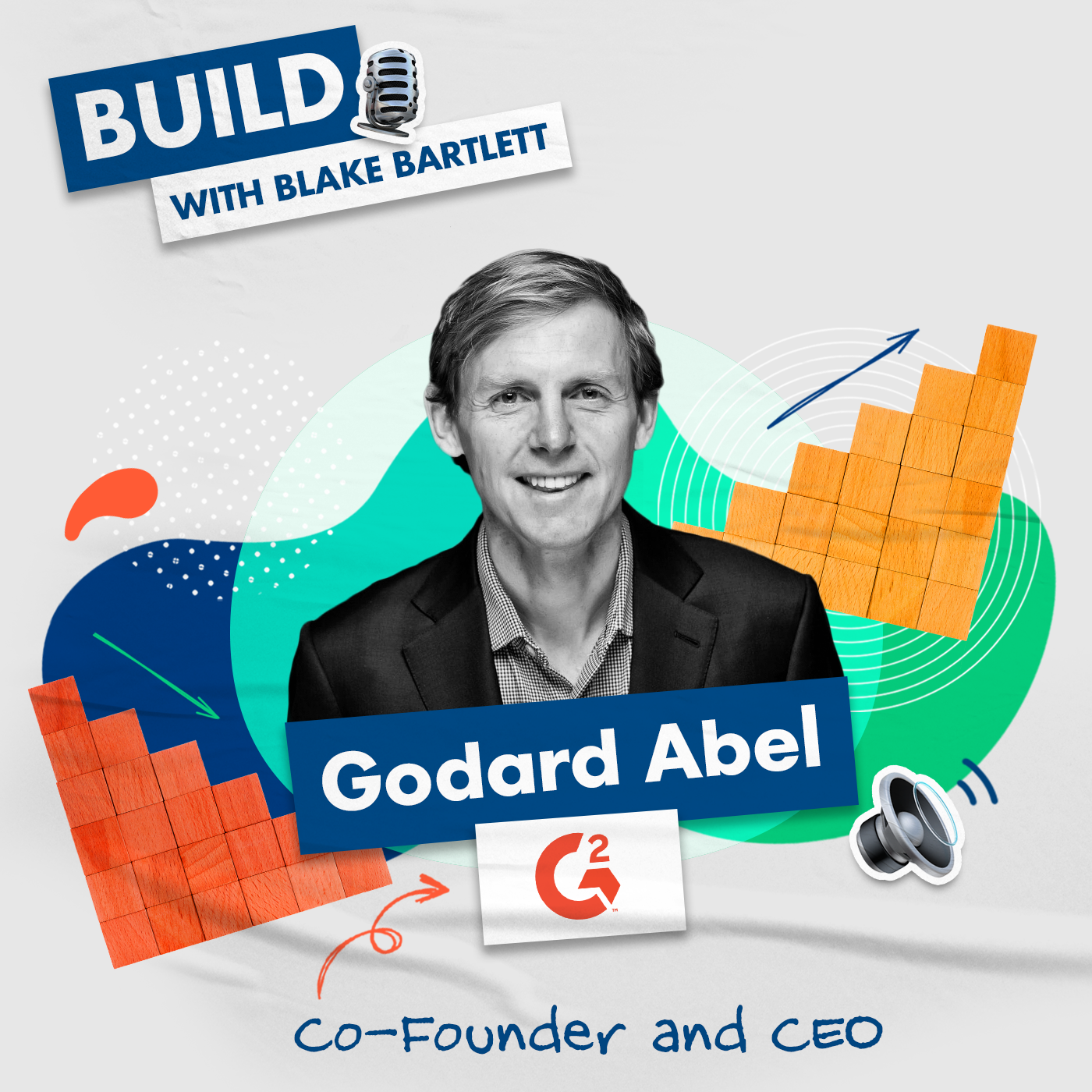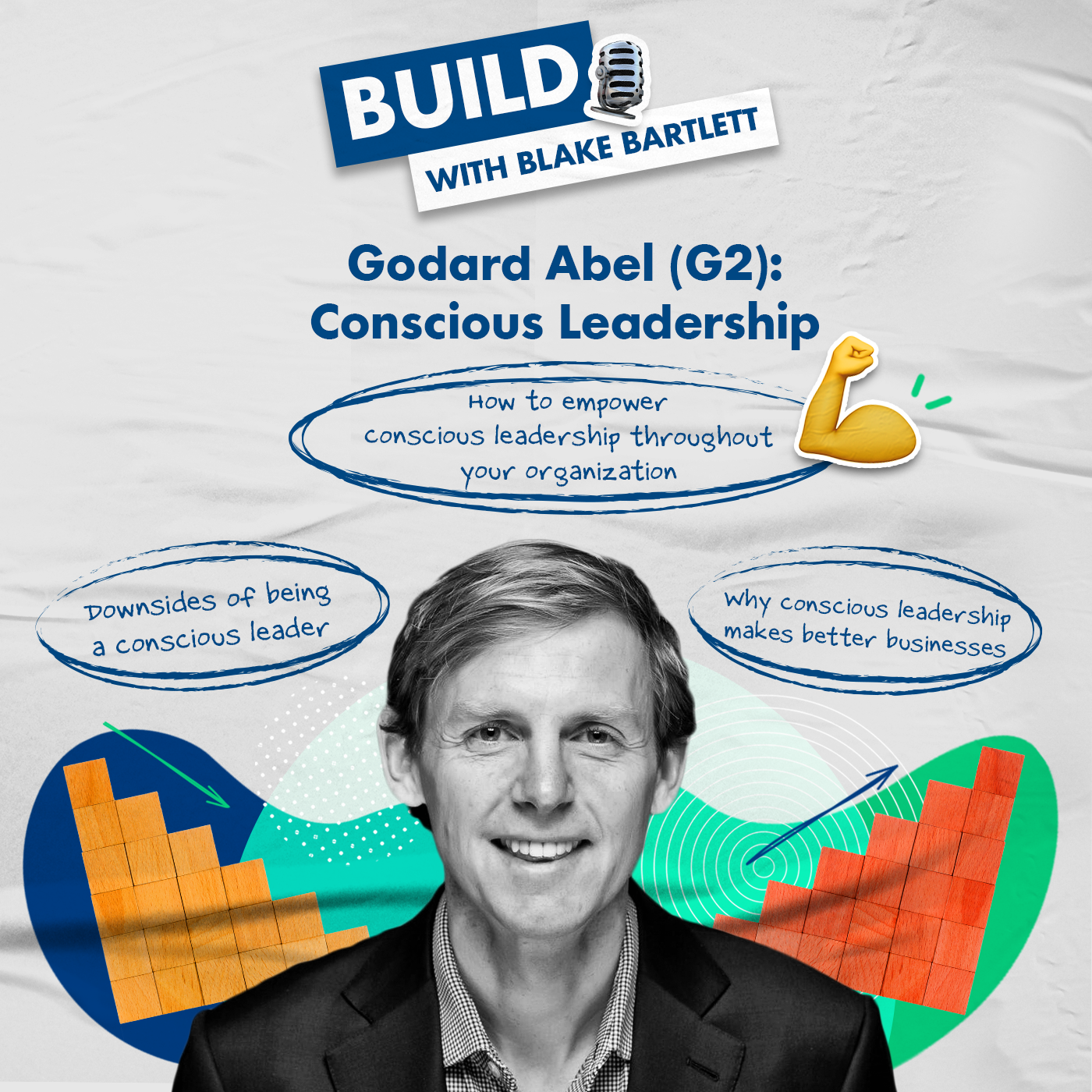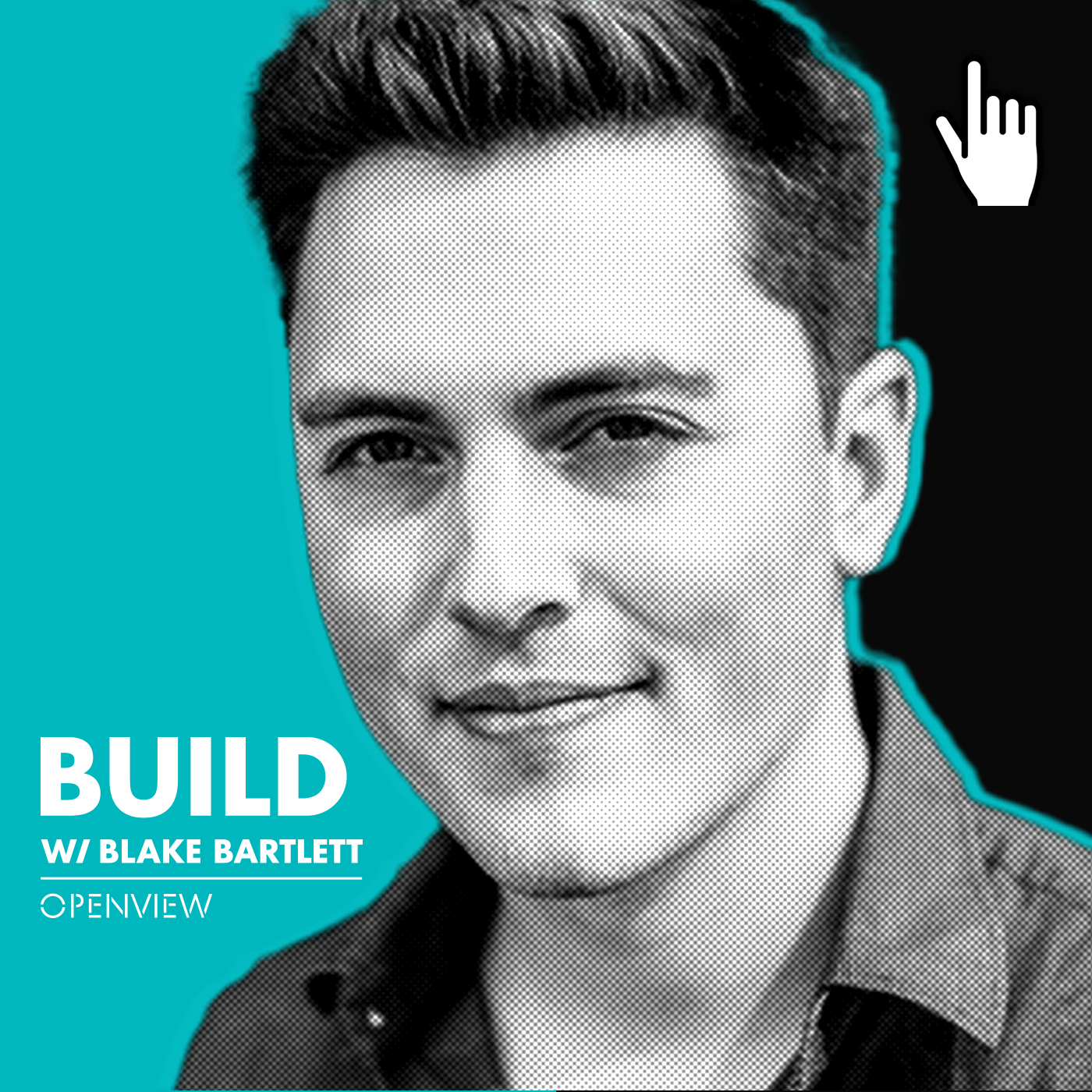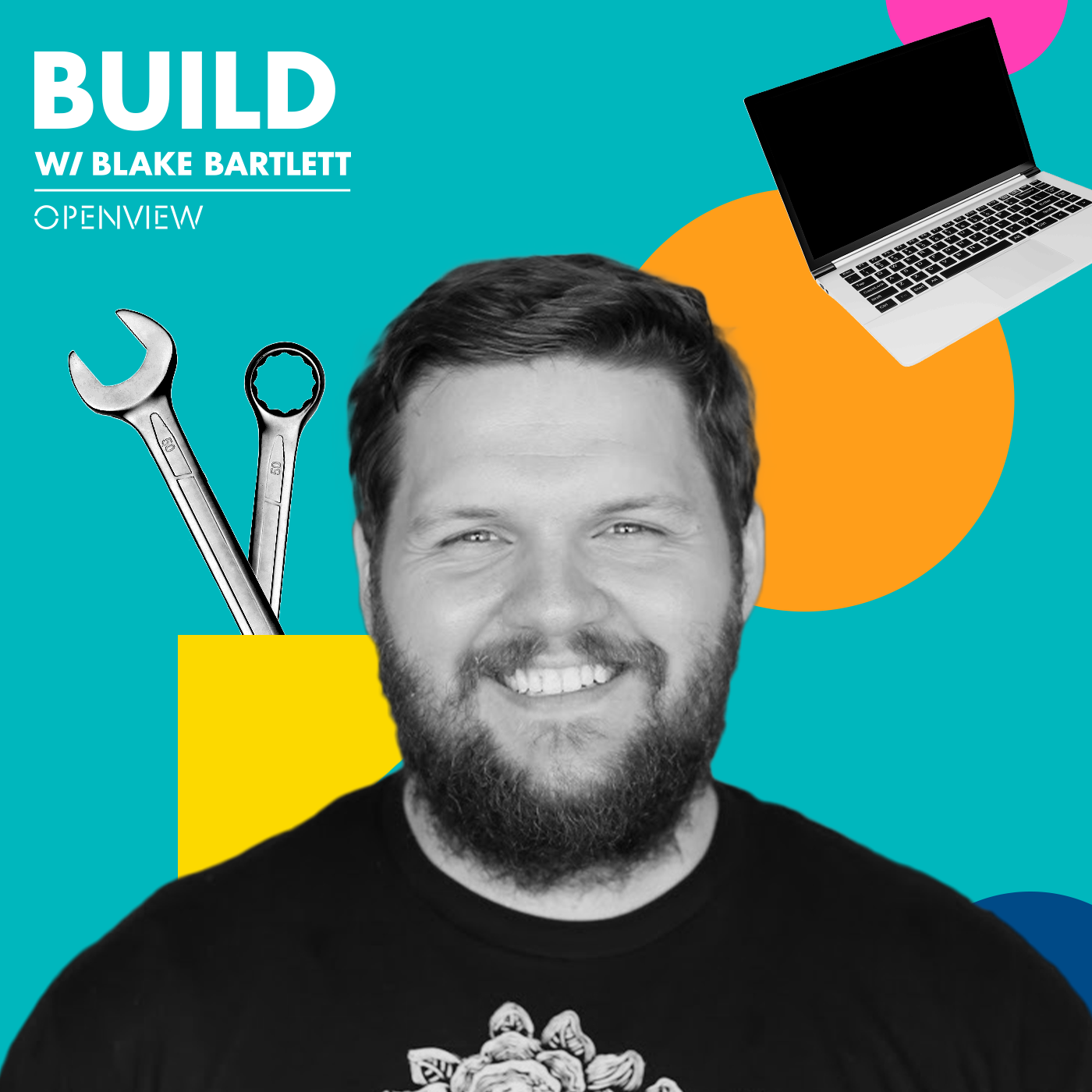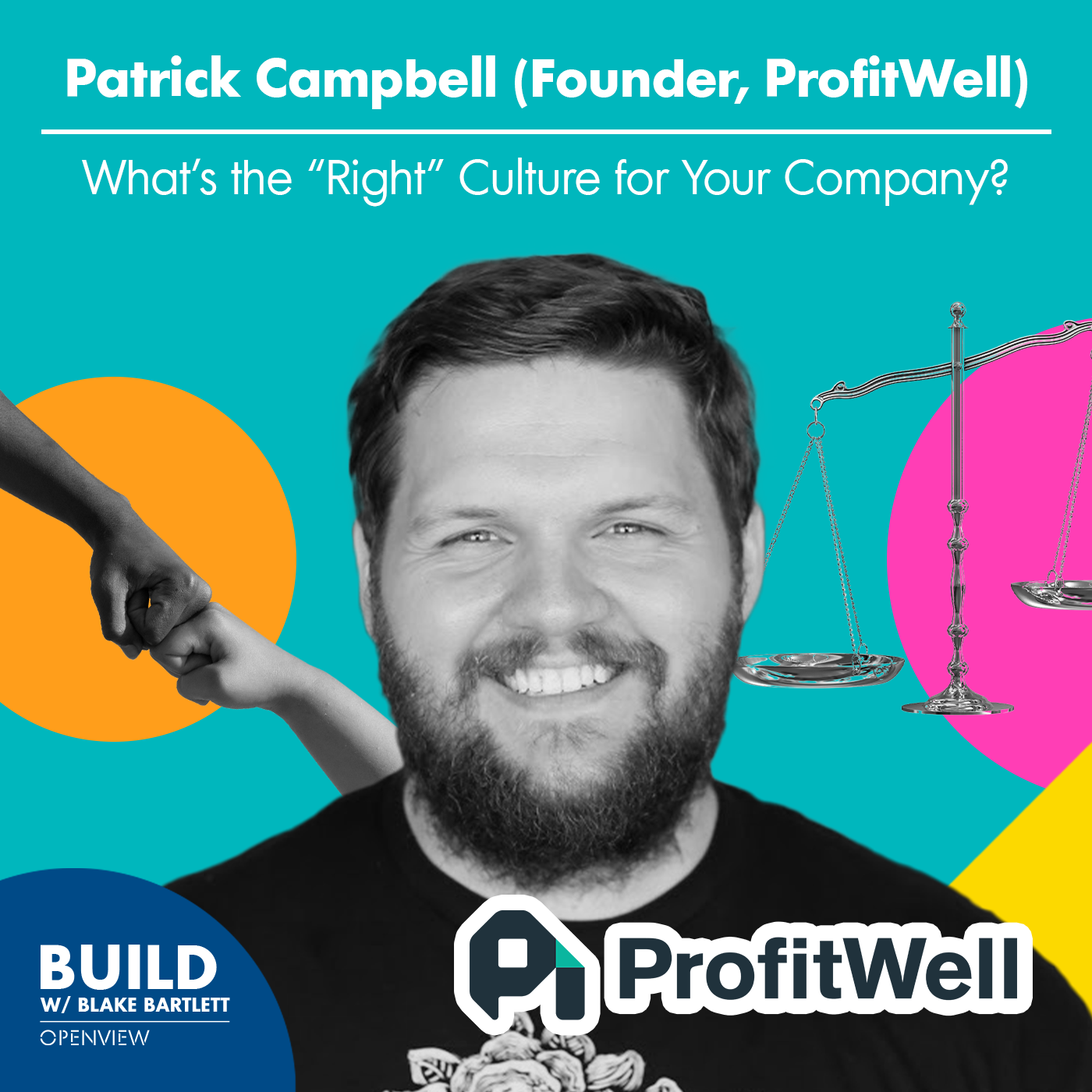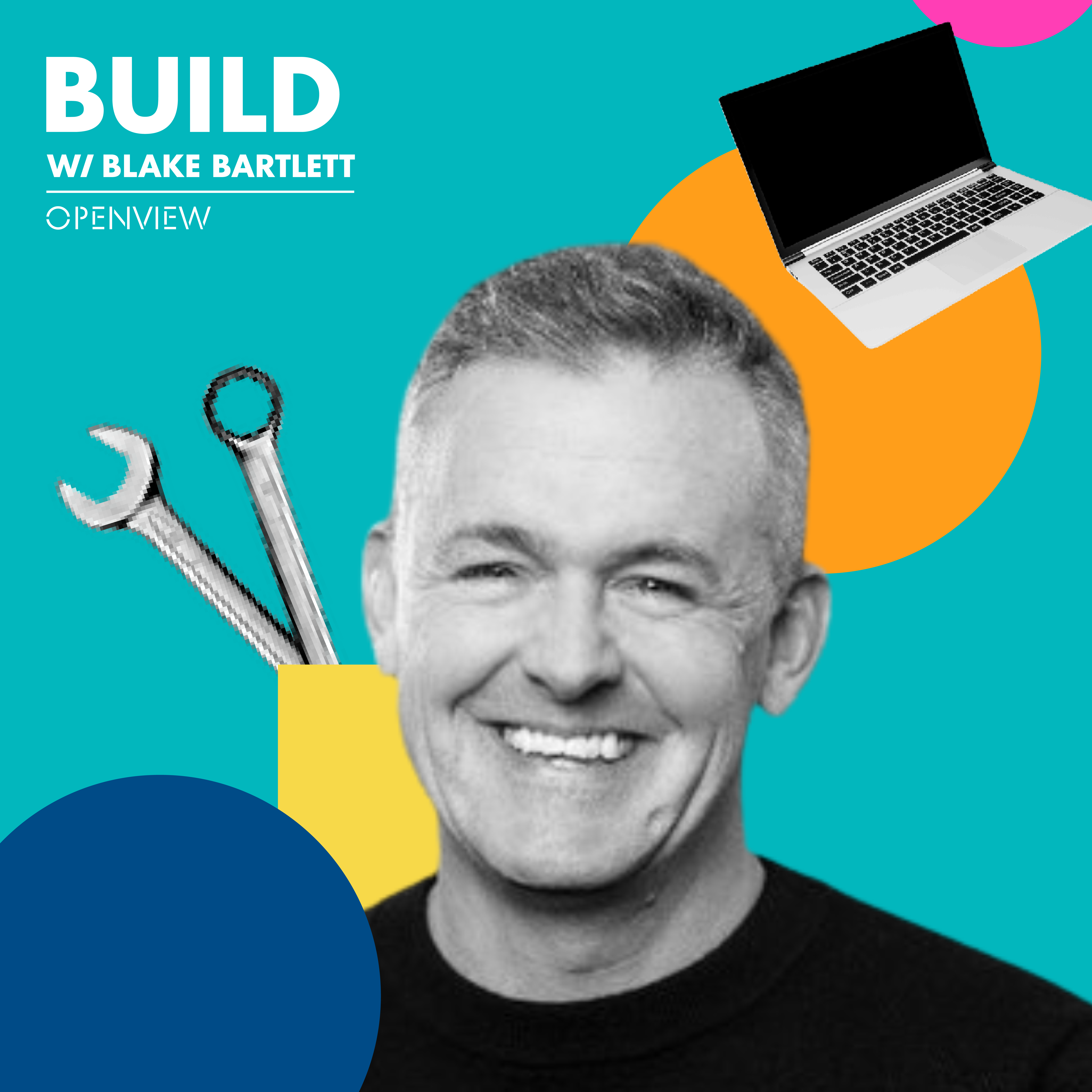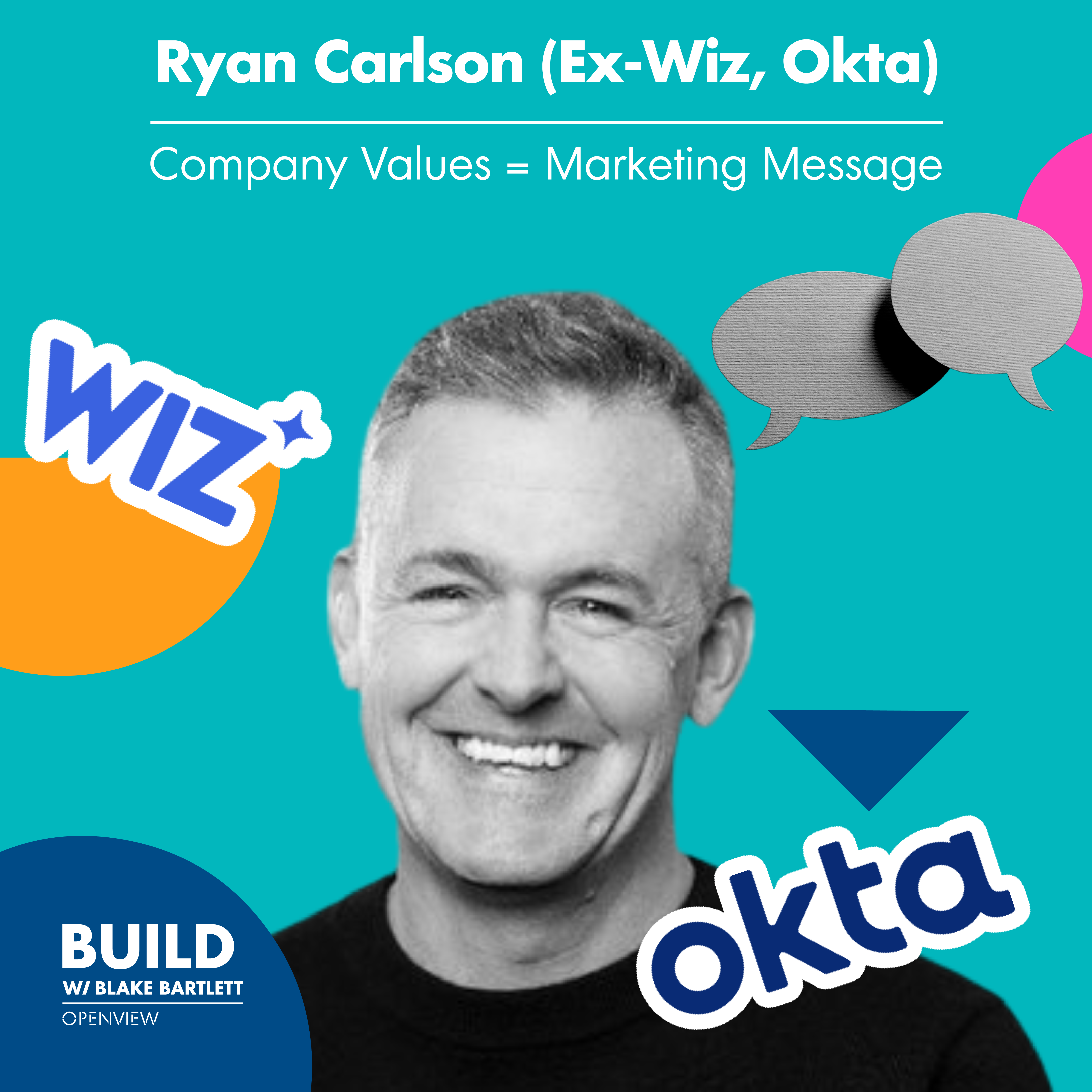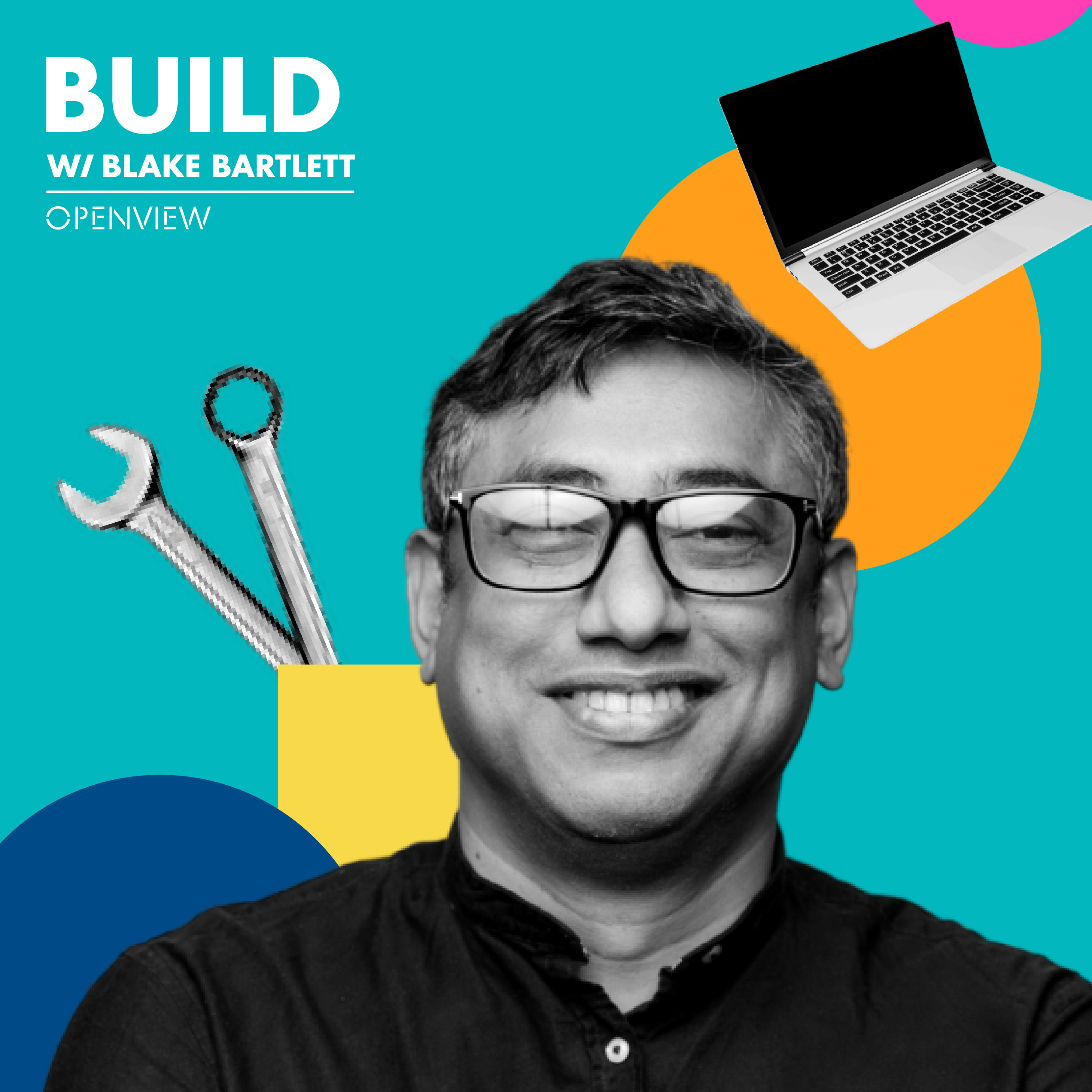Godard Abel (G2): Conscious Leadership
- 0.5
- 1
- 1.25
- 1.5
- 1.75
- 2
Gordard Abel: As a leader that's what's important, is tapping into the emotions of your team, just as much as having the aligned intellectual strategy, but also having that human, emotional connection, that emotional alignment with yourself, with your team, I think that's at least equally important to success of a company.
Blake Bartlett: Welcome back to the Build Podcast. I'm Blake Bartlett, a partner at OpenView. The world of SaaS is always evolving, and we are here to help you adapt, compete, and win with your startup. The Build Podcast brings you stories and insights from my conversations with the most success people in SaaS. In today's episode, I chat with Godard Abel, Co- founder and CEO of G2. As you likely know well, G2's reviews platform is an industry standard and it influences software buyers of all shapes and sizes. But today, Godard and I aren't talking about ratings, reviews or software purchasing decisions. Instead, we're talking about conscious leadership. It's the framework he uses with his management team, and by extension, the entire company. Godard tells us how conscious leadership has changed his company and his own life for the better. All that and more, on this episode of Build. So let's dive in with Godard Abel. Well, Godard, thank you so much for joining us here on the Build Podcast. It's great to have you on the show.
Gordard Abel: Yeah. Fun to be here with you, Blake.
Blake Bartlett: So, the discussion topic for today is conscious leadership. Which is a framework and a practice that you have adopted at G2. And there's a lot to unpack with this. So maybe first things first, on conscious leadership, how did you find conscious leadership? And why did it resonate with you?
Gordard Abel: Yeah, I found conscious leadership back in 2007. And I've been an entrepreneur now for over 20 years. I was building my first company, Big Machines, which was a SaaS CPQ company. And frankly, I struggled for many years, struggled with near failure. We started the company back in 2000.. com. inaudible raised a bunch of money, but three years later we were almost bankrupt. And then from there it turned into what felt like a big struggle. Ultimately, the business had success, but I also always had all this anxiety, fear, depression feeling my forehead. And conscious leadership to me was a way to grow beyond that, and to not only have success in business, but to become more conscious, more aware and enjoy the ride much more while becoming a better leader.
Blake Bartlett: So you kind of discovered it in the trenches, so to speak?
Gordard Abel: Yes, the trenches of entrepreneurship, and I think the challenges and seeking a more enlightened path to become a better leader, better human, have more success, but also enjoy the ride more.
Blake Bartlett: Before finding conscious leadership, were there other frameworks that you looked at or other sort of solutions to the problem?
Gordard Abel: To be honest, not on that plane. And obviously, I'd gotten a business school, been a consultant. So I knew all the kind of business strategy, HR, all that business stuff, but conscious leadership to me is on a different plane. Self- awareness, consciousness, presence. And I really had not explored that before.
Blake Bartlett: So a case study from a business school does not help you when you're actually in the moment needing to deal with very human issues that face you, especially when building a startup?
Gordard Abel: It doesn't help you with the emotions. And as an entrepreneur, I've found, obviously the business stuff is important, but I think more important to persevering succeeding is the emotional part. Yeah. Both your own emotions, your team's emotion. And I think as a leader, that's what's important, is tapping into the emotions of your team, just as much as having the aligned intellectual strategy, but also having that human, emotional connection, that emotional alignment with yourself, with your team, I think that's at least equally important to success of a company.
Blake Bartlett: So let's unpack the specifics of conscious leadership here. What's it all about?
Gordard Abel: Well, to me, it all starts with self- awareness as a leader and being more aware of my thoughts, my feelings, my emotions. So in that sense, a lot like mindfulness. And part of the practice, and then when I did meet my first conscious leadership coach, Jim Dethmer, one of the first things he taught me was to meditate in presence. That's how we'd start every coaching session with five to 10 minutes of just breathing and presencing. And so I think that's where it starts, becoming more aware of yourself and separating yourself from your thoughts and your stories that are always flying through your mind by becoming present and self aware.
Blake Bartlett: And now, where do you go from there? So you start with presencing, you start with mindfulness, and what's the next step?
Gordard Abel: I think the next step as a leader is then using that to one, learn faster about yourself, and I think one of the things I learned from Jim was, becoming aware of the feelings, the emotions that were going on in my body, and not just being so focused on my mind and having that be more attuned to my blind spot, things I might be missing. And then I get, especially as a leader becomes important and being able to better connect with my team, with your team as a leader. And because I do think when I show up more present, more open, I'm more curious with my team, I can learn more, learn faster and we can align faster to the common goal, the common purpose of achieving the mission of the company. And so I think that's where it really then becomes meaningful, where you can be more open to your team and you can remain what they call above the line, which is curious, open and really being open to learning together. And I think that's so much of what we do as an entrepreneur. You're listening to your customers, your team, your investors, integrating all that feedback in a common vision. But I think the more present, the more conscious you are, the better you can do that.
Blake Bartlett: So conscious leadership I know starts with oftentimes, at least some of the stuff that I've heard about it, it starts with this question of," Where am I right now?" And that then leads to one of two options." Am I above the line? Am I below the line?" You mentioned a little bit above line. What does this framework mean?
Gordard Abel: Yes. And I do think this question of," Where am I?" And above the line to me means when you're in that curious open state, when you're open to learning, to really listening to each other. And then below the line, and I often go there, where I'll be angry, I'll be righteous, where I just think I know the right answer, I just want something, and I will just impose that on my team. And so it's a very different state, and I think there can be some use in it. Sometimes you have a crisis, as leader you just need to make a quick decision and have the team move on. But I think the problem with being below line it leaves scar tissue, where you will hurt your team and you will lose connection and trust with them, which I think long term will really hurt you. Whereas, if you stay above the line, you stay open, then you can really fully leverage your team, their insights, their genius, and ultimately have a much more successful, much more healthy team.
Blake Bartlett: Yeah. And I found it interesting as well that, going below the line is something that we're actually kind of hardwired to do as humans. Evolutionarily speaking, we were meant to perceive threats to our survival, and then do radical things to avoid those threats and to defend ourselves against those threats. But today, our brains aren't capable of deciphering between a threat to our survival and a threat to our ego, and our brains treat it as the same thing. And so we are hardwired to go below the line to become more defensive and to become more focused on being right, rather than being curious.
Gordard Abel: Yeah.
Blake Bartlett: And I think that that is an impactful way to look at it. And it's also, it's a more gracious way to look at it. If you know that you're hardwired to go below the line, when it happens, you don't have to beat yourself up over it. It's more about being aware that it happened and taking a step back and say," How do I reset?"
Gordard Abel: No, I think, yeah, that's a good insight, Blake. And I do think when we're in nature, and when we have to run from a predator, a wolf, a coyote, whatever it is, right? The below line serves us well, it protects ourselves, we just go with instinct and we just go, we just run, we attack and we take quick action to survive. So it is there to protect ourselves physically. But I think a less healthy form of it it's just there to protect the ego. And you're right, luckily, and we say entrepreneurship, there's a lot of stress, it feels life or death, but the good news is, it's not truly life or death. And also coming out of awareness," Hey, if my startup fails, most of us were in tech. We can get another job, right. We can feed our families, so." But I think those same instincts can then hurt us because it does create all that anxiety, all that adrenaline. And if we're doing that to ourselves 200 times a day, then it just wears us down and the anxiety overwhelms us and we become less effective. And I do think what you said there, it's okay to be below line, that's what my coach, Jim always told me, and my coach Sue tells me today. It's just be aware, accept it. And then just doing that, oftentimes you shift back to being above the line.
Blake Bartlett: So jumping into a little bit more of the context at G2 and what this looks like in practice, how does it get instantiated into a team? And what does it look like day to day for you as a leader and for your leadership team around you?
Gordard Abel: Yeah. And to instantiate it for a team, well, number one, I aim to keep working on myself, because I still often go below line. So one, I aim to work on myself, model that behavior. And number two, what we've done, we've hired a company coach, Sue Heilbronner. She's also our conscious leadership coach. She actually also learned from Jim Dethmer and his group. And somewhat, I would say a disciple of Jim. But she's been coaching us now for the last two years. And it's actually the first company... I've started doing conscious leadership my prior two companies, but I only worked on myself. And I said," Wow, to really have the impact, I want to bring this to my team." And so now Sue works with all of us. She comes to every leadership meeting I have, she comes to offsite. She also does one- on- one sessions with my leadership team. And just this morning, we did a conscious check- in with my C- level leaders and myself. And we do that once a month to really focus on the unsaids, what feelings, what emotions are we withholding from each other, what perceived hard messages haven't we given each other, where are we not aligned? And so that's a really cool exercise, because I think that tends to happen in teams. You don't want to hurt each other. You want to be polite, you're too busy, and so we withhold from each other. And that's I think what Sue also really brings, is make sure we fully reveal ourselves to each other.
Blake Bartlett: I like this idea that there is both, if you will, first party value and collective community value or team value in adopting something like conscious leadership. The first party value is being just that much more aware of what puts you above the line, what puts you below the line and living in this way and leading in this way that's oriented towards commitments. And so it is going to make you a better leader and there's going to be a lot of that sort of personal first party benefit, if you will. But when you think about it, and I know that conscious leadership is all about these commitments, the 15 commitments. But when you view those as not just commitments that I'm making as an individual, but commitments that we're all making together, to one another, and that we're all sort of on the same page and we're all going to operate in the same way. We're all going to communicate in the same way, we're all going to agree as to what's good behavior and bad behavior in a meeting or when there's a difficult decision. And so when you get it to be that mutual commitment, we're all on the same page, it creates the opportunity for really exponential impact of a framework like this.
Gordard Abel: Indeed. And I think we can also start to coach each other, because I still go below the line, but now not just Sue can call me out, but my CRO, Mike, my CMO, Amanda, they can all... We're learning together and we can keep coaching other all the time.
Blake Bartlett: Now I mentioned that there's these 15 Commitments. We don't have to go through all 15. There's a lot. I encourage folks to go check out conscious leadership, all kinds of things to dig into, but what's your favorite? Which ones stand out and are always front and center for you?
Gordard Abel: Yeah. And they put them in a sequence on purpose. So I do like the first one, especially, where they really talk about taking responsibility for your own experience. And they talk about a hundred percent ownership say," Oh, I think this meeting is boring." Or" This is wasting my time." And a lot of us do that, I know I do that at times. And then the hundred percent responsibility is like," Well, how am I contributing to that? And could I speak up and take the meeting in a different direction, where it will become engaging and will become productive?" Versus just sitting back. And they also talk about this victim, villain, hero triangle. In that case, I'm on the triangle. And when you're below the line, you're on a triangle. But in that case, I'm being a victim," Oh, this meeting's boring. They're wasting my time." And I'm below the line versus if I shift back to presence, curiosity, I could be more curious." What's the speaker really trying to get across that I'm not listening to?" Or" How could I change the path of this meeting to make it productive, to make it engaging?" Versus just sitting back," Hey, it's not my meeting. I'm just going to sit back here quietly as a victim, stew." Versus owning my hundred percent." How can I change my experience in the moment?"
Blake Bartlett: And one of the commitments that I found very interesting, because at first blush, it is different than what you would typically expect in business advice. And that is the commitment around feelings. A lot of times the general sentiment is like," Your feelings don't belong in the workplace. Let's get business done."
Gordard Abel: Yeah.
Blake Bartlett: But feelings is one of the commitments, and specifically it's," I commit to feeling my feelings all the way through to completion." So what does that mean?
Gordard Abel: Yeah. And I think you're right, Blake. A lot of times in the NBA consulting world, we're taught to" like, Hey, just look at the data." Right? And a lot of like business executives," I'm just going to let the data, make the decisions. I'll let the algorithm decide." And I think conscious leadership takes a different view that there's a lot of insight, a lot of wisdom in our feelings. And I think my story, conscious leadership's story is," Hey, there's probably something to that. There's more that the data's not telling." And which then you can be curious, be like," Hey, I know the data says that, but I was just talking to a customer, they're not feeling it. Right? The metrics look perfect, but they're not feeling it and I'm not feeling it." So I think there's business insight in the feelings and the other advantage of feeling your feelings to completion, what Jim Dethmer always says," Any feeling, joy, sadness, anger, any feeling, if you feel it to completion, it tends to be gone within 60 seconds." And he would say," Even the most intense pain." My mother passed away last year and I felt tremendous sorrow tremendous sadness. And I think I'm not yet this conscious, but I think Jim would say," Even in that moment, if you really feel the sadness to completion, it will be gone in 60 seconds." Whereas if you trap it, you don't fully feel it, you try to avoid it, then it lives on. You're trapping the energy waves in your head and that emotional could live on with you forever. And if you keep doing that, then all of a sudden, you're kind of just caught in this storm cloud of lingering emotion that you haven't felt to completion. What they also teach is normally we say," Hey, we only want joy. We don't want sadness, we don't want fear, we don't want anger." But if you block one, you block them all. And entrepreneurship is such an emotion roller coaster. To me, that's ultimately also why I do it. You get the tremendous high, but you also get the tremendous lows. And if you can be comfortable feeling both, then you feel really alive and you can really enjoy the ride. And so that's also what I'm aiming to do.
Blake Bartlett: Yeah. It's using another one of the commitments about curiosity, having curiosity. I think you can have curiosity towards your own feelings. And a lot of times we don't have curiosity. We just feel the feeling and especially, if it's a bad feeling, you just start doing things to make it go away and to stop feeling the bad feeling. And so if you're in a meeting, and the bad feeling is," I feel like I'm being criticized," then the things you start doing to make that feeling go way is, be defensive or fight back. And instead, recognizing the feeling and then applying that curiosity," Huh? That's interesting. I feel this way. Why do I feel that way?" And then allowing the cycle to go through and to feel the feeling, and it won't then be the thing that drove you to have a terrible back to back meetings the entire day and piss off your entire team and screw up a deal or two along the way.
Gordard Abel: Yes.
Blake Bartlett: It will allow you to have it resolved in 60 seconds, move back above the line, and then the rest of your day, by focusing on your feelings and being curious about your feelings and allow yourself to feel them to completion, it will actually make your day more productive. And the business value will come because you're working from the right set point.
Gordard Abel: I think that's a great insight, Blake. Yeah. Then you can be curious," What's my feeling telling me?" And I find this is hardest when I get feedback, and probably for all of us. And my story is for all of us. And it's back to that survival instinct we have in nature, where we're trying to protect ourselves. But I think feedback is a lot like that. And again, none of our situations in tech are truly life or death or almost none of them. Yeah, but it feels like it when someone's criticizing our work, or criticizing me as a CEO, or I get a negative Glassdoor review. It does always hurt. And you're right, my fight or flight instinct is I'm just going to, I'm going to get angry, I'm going to defend it, I'm going to say it's BS, it's not true versus being curious," Hey, what is it in what this person is saying that could be true? How might I learn from it? How might I get better?" And so, one of the things I also teach in conscious leadership, they say the only thing you should do, do you know what the only thing is you should do when you get feedback, Blake?
Blake Bartlett: Receive it?
Gordard Abel: Yes. They just say," Just say, thank you." And this is also really hard for me," Don't react, don't defend, and then just kind of let it sit and then come back the next day." And then you can choose, was there something valid to the feedback you got Blake? Or is it something you choose to discard for whatever reason? But I still struggle with that, because always when somebody criticizes me, or even if it's customer feedback, something bad G2 is doing, I always want to defend. Right? Versus just saying, thank you, letting it soak in and then coming back the next day from a place of above the line, but giving ourselves that because naturally, and I still do this, like when I get negative feedback, I still withdraw, I still go below the line. So that's why if I just say thank you and wait, then I can come back to it later from an above the line perspective.
Blake Bartlett: Yeah. It's amazing, the age old advice of, sleep on it.
Gordard Abel: Yes.
Blake Bartlett: How often that is impactful. You think you want to send that email? Well, sleep on it. Let's see if you's still one to send it tomorrow. You think you want to defend when you got that feedback? Well, sleep on it. Maybe there's a nugget of wisdom in there that you actually needed to hear.
Gordard Abel: And I think you're right. And Blake, especially by email and we've all done it, right? I've done it where someone sends you a harsh email, and then we want to send back like six paragraphs about why they're wrong, why I'm right and what they're missing. And that never helps. So at a minimum, don't reply to the email or if you feel the need to reply, just say," Thank you." And" Hey, let's find the time to talk about this later." So both parties have some time to cool off versus being attached to righteousness and being right. But it's still hard, right? It's like intellectually simple, but emotionally for me, it's still hard.
Blake Bartlett: As all powerful principles are. Much harder in practice than in speaking about it. But we're talking a lot about all of the good things here, and the potential impact, and what it looks like in practice, but for anyone that's listening right now and considering," Hey, I want to look into this conscious leadership thing a little bit more," What are some of the downsides that folks should be mindful of, or things that you'll need to adapt through, if you do embrace a framework like this?
Gordard Abel: Yeah. I mean, I will say it slows you down. And so, there's moments when you're in a true crisis, when those below line instincts might actually be the right ones. And we have those on occasion in the company, most of the time we don't, right? Where we just got to act. Something's blowing up, site's down, we don't know how to... My story isn't and some of those times it may slow you down, right? Where it's like," Hey, let's take touch with our feelings. No, let's just get the fricking site back up." So there are those moments, but I think most of the time to me it's worth taking the time, but it will slow your leadership process down. And even we begin every leadership meeting now with a conscious check- in, that actually takes the first 15 minutes, where we're not talking about business where we're not making decisions. So I think you have to be willing to invest the extra time. And we're also investing money in it. We actually, we pay our coach a significant retainer every year. And so it does cost time, money, and effort. And like all coaching, I think it only works if you're truly open to it. And also what my coach said, and I didn't really get into this until 2007. I think I was 37 years old. And yeah, my coach also said," Hey, you probably weren't open to this earlier in your career." And it maybe true for a lot of people. In my twenties, I was just kind of an adrenaline junkie and maybe I wouldn't have even been open to learning. So I think you also have to be open to it and you have to be at a place where you're ready to learn on this dimension. And I think there's a right time in life for all of us when that comes and it's different for everybody. But I think also just something to be aware of, don't force it, right? If it feels like torturous or this conscious leadership stuff it just feels hard," I'm not genuinely curious about it," then I'd say don't do it. But my story is, most people get to that point in life, where they're like," Oh wow, I do want to become more self aware. I do want to grow." And for me that was fairly late in life. So I hope others can find it sooner. But I think that has to genuinely feel like a choice you want to make.
Blake Bartlett: I've recently out and obsessed with this idea of removing shoulds from your life.
Gordard Abel: Yes.
Blake Bartlett: Because shoulds are usually things that you don't want to do, but somebody else told you, you should do. Or you read in an article somewhere that you should do. And so then you start saying," Well, I really should do this."
Gordard Abel: Yeah.
Blake Bartlett: And then you end up with a life, or a work life or whatever it is, that's full of things that you should be doing that you don't want to be doing. And so back to conscious leadership, if you're listening to this right now, thinking you should embrace it, that's not the point of the conversation. You should consider it. You should learn more. But then as you said, if it really resonates with you and if it's the thing that you have genuine curiosity about, and as you learn more, you fall in love with it and you see the potential impact of it, then yeah, move forward. But this idea of shoulds and sort of feeling obligated to do something, because you heard it on a podcast or read it in an article, usually leads to more harm than benefit.
Gordard Abel: I think you're right. Listen to your feelings on this as well. So if it feels right and you're naturally curious, you want to explore it, awesome. So there's another Commitment 8 about genius, getting in your zone of genius. And my story is also when we're in a should state, we're never in our zone of genius. And that's probably my other goal with conscious leadership living is to get net zone, where you feel that ease in flow, you're doing your best work. That's the zone I love being in, I think most of us love being in that zone. And my story is, yeah, if I'm doing a should, it doesn't feel like that zone, right? The zone is like, this is my natural gift, this is what I'm meant to be doing. It's just flowing through me, which I think is also the ultimate conscious state. Right? It's not happening to me, it's not happening by me, it's just kind of flowing through me and I'm just bringing my natural gifts to the world. And I think we all have those moments. It could be a simple thing, like we're writing a blog post and it's just flowing. I'm not writing it, it's just being written through me. And that's, I think when we're in that zone and I think you can also feel it in sports. Like I'm a runner and I wish I had it every day, but some of those days I just have that run where I'm like, I'm running faster than ever, and it feels super easy, it's effortless. And I'm actually kind of watching myself run, it's not even me. And I think, and whatever our passions are, right? For some people it's music, and it can happen at work as well. But if we can find that zone, where we do have that ease in flow, it's kind of effortless, but we're getting a lot done, we're contributing a lot. That to me is the magical zone.
Blake Bartlett: So you started to touch on that there, but I wonder in closing, outside of the professional benefits and the benefits to yourself as a leader, the benefits to a team and an organization, how is consciously leadership impacted your personal life?
Gordard Abel: Yeah. And it's tremendously helped me. And that's where I say, it's not just conscious leadership, but conscious living. And I mentioned running, I love running, but also in 2007, 2008, when I first started on this journey, I dealt with my anxiety a lot of times by overeating, dealing with my stress by having an extra snack in the kitchen, I was drinking like six diet Cokes a day. I never drink one anymore. I was drinking too much alcohol, because at the end of the week, I just couldn't handle it anymore. So I'd go have a few too many drinks. And as a result, I was also overweight. And then I made the shift and really, without even trying, a lot of those habits stopped. And I am a runner, one of my dreams was always to run the Boston Marathon and you do have to qualify. I think at that age, I had to run under 3: 10, which is a pretty fast marathon, pretty much running seven minutes a mile. I'd never done that before in my life. But then I also applied the same zone, the same consciousness. And then I ran Boston Marathon in 3: 04. And it was one of those amazing experiences where I got in the zone and it felt easy. Although, to me, it felt like a tremendous accomplishment. And so, it certainly helped my health. I also feel more connected to my wife, my kids, we have three kids. And I also when I was in this anxiety, they were infants and my life just felt so overwhelming. So I wasn't great at connecting with them. I'd be at home, my wife at dinner, I'd still be thinking about work, wanting to check my phone instead of just being with my family and enjoying my life with them. And all of that has now improved. And I still drift, but I do the same thing at the dinner table where, if I'm drifting below the line, drifting back to work, I just shift, I breathe and I can enjoy the time with my family. And so that's why I love this journey. I do think it can make all facets of our life better.
Blake Bartlett: Well, Godard, thank you so much for joining us on the Build Podcast here today to talk about conscious leadership, but also that in the context of conscious living. Lots of good stuff here and really appreciate you taking the time now.
Gordard Abel: No, thank you, Blake. And glad you're now on the conscious leadership journey with me.( silence).
Blake Bartlett: Thanks for listening to this episode of Build. If you like what you've heard, leave us a review on Apple Podcasts. And subscribe to stay up to date with all the new episodes. Want more insights from OpenView? Follow me, Blake Bartlett on LinkedIn for daily PLG content. And head to our website to sign up for our weekly newsletter.( silence)
DESCRIPTION
Godard credits much of G2’s success to the practice of Conscious Leadership across the management team. It’s a framework that helps leaders build trust and create conscious cultures. Learn how Godard discovered it during a time of leadership difficulty, and how he implements it today.
Key Takeaways:
[1:51] How did Godard find conscious leadership and why did it resonate with him?
[2:58] Before finding conscious leadership, were there other frameworks that Godard looked at or other sort of solutions to the problem?
[4:08] What is conscious leadership about?
[6:19:] What does “above the line’ or “belong the line” mean? What is this framework about?
[8:20] We’re hardwired to go below the line; we don't have to beat yourself up over it. It's more about being aware that it happened and taking a step back and saying, how do we reset?
[9:33] How does conscious leadership get instantiated into a team? What does it look like day-to-day for Godard as a leader and for his leadership team around him?
[12:02] Godard explains how they started to coach each other in his team at G2.
[12:27] Which is Godard's favorite commitment (out of the 15 commitments in conscious leadership)?
[14:07] One commitment says “I commit to feeling my feelings all the way through to completion.” What does it mean?
[16:30] Blake shares the importance of not only letting yourself feel your feelings but also to be curious about them.
[18:10] What should you do when getting feedback? Say thank you and wait.
[20:14] What are some of the downsides that people should be mindful of or things that will need to be adapted if they embrace a framework like this?
[23:01] Remove the "shoulds" from your life.
{24:41] Outside of the professional benefits and the benefits to Godard as a leader, the benefits to a team and an organization, how has conscious leadership impacted Godard’s personal life?
Mentioned in this episode:
Godard Abel, Co-Founder and CEO at G2
Follow Blake Bartlett on Linkedin.
Podcast produced by OpenView.
View our blog for more context/inspiration.
Today's Host
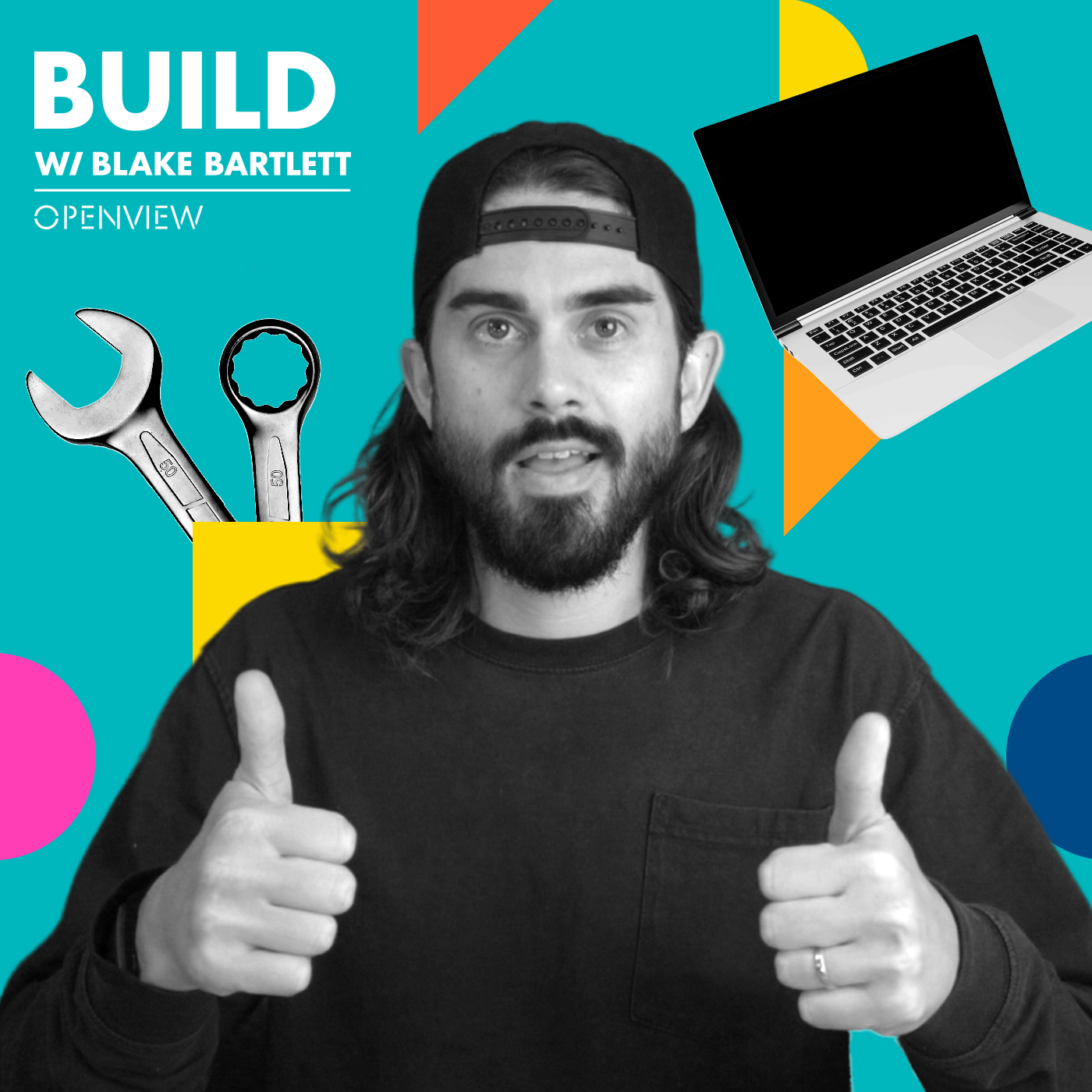
Blake Bartlett
Today's Guests
